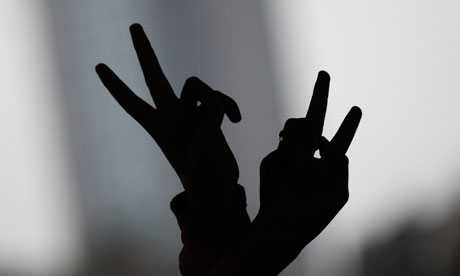There are no taboos left on the Kurdish issue and Recep Tayyip Erdogan knows the geopolitical importance of resolving it
-
- guardian.co.uk,

A pro-Kurdish demonstrator gestures during a protest in Istanbul on February 15, 2013 held to mark the 14th anniversary of the capture of Kurdistan Workers’ party (PKK) leader Abdullah Ocalan. Photograph: Murad Sezer/Reuters
Since the start of this year, the Justice and Development party (AKP) has emerged from what looked like an impasse over Turkey’s three-decade-long Kurdish conflict. The pace of change has been intense.
But slow-motion progress in the background has often been overlooked: over the course of 15 years the public debate, backed by small-scale reforms, has evolved from the archaic militarist jargon of “there are no Kurds here, only mountain Turks”. Ankara is now conducting direct negotiations with the jailed PKK leader, Abdullah Ocalan – once demonised as a baby killer and chief terrorist by a venomously nationalist “mainstream” media.
Today, there are no more taboos left on the subject. All gone. The period of official denial is over. So is the mass-hypnosis inflicted on the Turkish people by the old establishment. Even Kemal Ataturk, the once untouchable founder of the republic, is under fire these days for his role in the systematic oppression of Turkey’s Kurds during the 1920s and 30s.
Yet, as recently as 2012, the Sri Lankan model still held some sway in Ankara: total annihilation of an armed rebellion by military means only. It was abandoned quickly: the spread across borders of Kurdish militants and the army’s failures in counter-insurgency made it an impossible position to maintain even for the toughest hard-liners. It looked as if talks, already initiated in 2009 without success, were the only way. The turmoil in Syria and good relations with Iraqi Kurds has also made it a priority.
But the give-and-take process is only just beginning. The task of dealing with a problem which has massive cross-border dimensions is huge.
At home, the prime minister, Recep Tayyip Erdogan also has to deal with a public split on the issue and a fierce opposition of nationalists and Kemalists. He has to mesh the process with the development of a new, democratic constitution. He has to make careful calculations with regard to all his neighbours that have Kurdish populations – Iraq, Syria and Iran – who are following his moves uneasily.
In Ankara’s corridors of power, the reasoning goes like this: unless Turkey adopts a new constitution, its social fabric will remain weak, and it won’t be able to proceed further on the path towards EU membership. Unless Turkey deals peacefully with its own Kurdish issue, it won’t be able to control the Kurdish unrest in Syria and Iraq or play the role it aspires to, that of a strong regional player.
Sworn enemies of the AKP here are certain that Erdogan will use the process to achieve his dream of becoming Turkey’s Putin. They are joined by a more cautious chorus of liberals and moderate Muslims, who voice legitimate concerns that democratisation could be undermined if he pushes the issue of an empowered presidency too far.
But there is no concrete sign that Erdogan will; neither does he need a new model for executive power. The current one makes already Turkey’s president more powerful than Barack Obama.
For Ocalan, it is also complicated. The “deal” with Ankara may lead, after disarmament and a mass amnesty synched with the adoption of a new constitution, to his freedom. But, given the sensitivity of the process, it is an issue neither side wants to raise at the moment. The PKK will not vanish with disarmament. The idea instead is to pull it fully into national and local politics, without arms.
In terms of opposition, there is not much that stands between Erdogan and his goal. The elected opposition, the Kemalist CHP and ultra-nationalist MHP, are led by political midgets whom Erdogan is able to mock daily. The greatest opponent of a “civilian solution” to the Kurdish issue, the army, has been pushed back into the barracks, by coup trials and prison verdicts.
The economy, which has created a middle class that is now larger than ever, makes conditions ripe for things to move forward. If the only real obstacles domestically are acts of folly or provocations by the “shadow state”, the real unknown is how neighbouring countries will react. Despite some mutual mistrust, Erdogan is counting on on his strong trading partner, Massoud Barzani, the Iraqi Kurdish regional president, to assist in disarmament. It is also in Barzani’s interests to get rid of a insurgency movement based in his own territory.
If the process succeeds according to the “disarmament-amnesty-reform” framework, both Kurds and Turks who will be winners. Any country in the geopolitical area that wins over the region’s Kurds will have an advantage over the others.
Erdogan’s dream is to rule over a country freed from the shackles of the Kurdish issue and a outdated constitution.
And who knows, maybe he also dreams of a Nobel peace prize.
via Turkey and the Kurds: the era of mass hypnosis is over | Yavuz Baydar | Comment is free | guardian.co.uk.